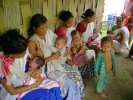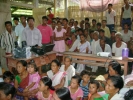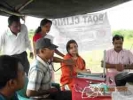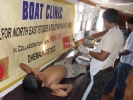By the Brahmaputra (Vol: 7) C-NES Newsletter
Editorial
There is good news on the environment front: the Central Government has declared that the Gangetic dolphin, found, as its name suggests, in the Ganges, its tributaries and also in the Brahmaputra and smaller rivers of the North-east, is the National Aquatic Animal. This is a major and welcome boost to efforts to conserve and protect the species, among the four surviving fresh water dolphin species in the world. New Delhi’s announcement follows the Assam Government’s decision last year to designate the highly endangered species, which is beloved for its spectacular leap out of the water but has been hunted for its blubber which is used, of all things, for fish bait, as the State Aquatic Animal; the state government took this significant decision after years of persistent briefings and lobbying by C-NES at the official and political levels, especially with Chief Minister Tarun Gogoi and Environment and Forests Minister Rockybul Hussain. A draft proposal for government was developed by us and then the then Principal Chief Conservator of Forests (Wildlife) MC Malakar skillfully piloted it through the labyrinth of official files and offices before the Forests Minister placed it before Mr. Gogoi for his signature and clearance. Much is also due to the solid work by our team as also that of other groups such as Aranyak which have done such detailed and excellent scientific research over the years. But the key has been to move from lab to field, to mobilize communities and help them understand that the dolphin is their greatest natural asset – both as a tourist attraction and livelihood generator but also as a way of assessing the fragility or strength of the river eco-system as the dolphin is at the top of the aquatic food chain. Without involving local residents in this effort, it would not have been possible to move the process forward. As one statesman has said, “An ounce of practice is worth many tons of theory.” We also had organized a Children’s Summit last year with fun and competitions about the dolphin, a film premiere of a documentary on the mammal (Children of the River: the xihus of Assam, directed by Maulee Senapati) around the time of the World Earth Day, when the state government announced its momentous decision. A lot of credit is also due to Dr. RK Sinha, head of the Department of Zoology at Patna University, who developed the organic alternative to dolphin oil for use as fish bait: this was the use of fish gut which, when heated produces an oil very similar to dolphin oil. This alternative is cheap – since fish intestines are often thrown away as waste – but the results were dramatic: a three fold rise in fish catch and incomes. As a result, the Binn community, descendants of Bihari fishermen who had migrated generations back to Assam, and who hunted the dolphin for its oil, are delighted and propagating the virtues of fish gut as the mantra for better incomes. In the process, the dolphin, with its small numbers in Assam (about 270), is getting a fresh lease of life.
We have other good news from C-NES:
-
We have signed an MOU with the Population Foundation of India to develop a programme for family planning in five districts of Upper Assam; this is a three-year project that will support the fine work and outreach achieved through an ongoing partnership of the innovative boat clinics with the National Rural Health Mission, Government of Assam, by focusing on propagating family planning methods. One of the products we envisage is a set of documentary films on the boat clinics. Talking about the Boat Clinics, I must commend our program management team and in the districts – district program officers, doctors and medical teams, including the nurses, lab technicians, pharmacists and village organizers — for their magnificent effort through this year, when I have been devastated by a personal loss in the passing of my wife and life partner, Minal, to sustain, develop and deepen the programme. Their work has meant that we are close to realizing our vision to reach 300,000 persons on the islands of the Brahmaputra by the end of 2009 with sustained health care for the first time in their lives, with an emphasis on women and child care.
-
Another agreement has been signed with the Boll Foundation of Germany to conduct a year-long project on the Impact of Conflict on Women, with a special focus on Assam and Nagaland. This takes forward the work of an earlier research study that C-NES had done on the same theme, with a review of this very issue in Nagaland and Tripura.
-
Bhaskar Saud, who was associated with the Ford Foundation supported dolphin conservation project referred to above, has been awarded a fellowship by the Guwahati-based Foundation for Social Transformation to conduct a study on the impact of vehicular pollution, an issue that has long concerned many of us, in Shillong and Guwahati. This is a year-long study which Bhaskar is expected to complete: he will look after the Guwahati segment while a scholar in Shillong is to do the research for that town. But we are still to finalize the latter and those interested should apply to us at the C-NES office in Guwahati. Our details are listed on this website.
<
p align=”justify”>SanjoyHazarika
Managing Trustee
Programme Highlights
Media institute has Managing Trustee on Faculty
Sanjoy Hazarika, Managing Trustee of C-NES has been appointed member of the Advisory Board of the International Media Institute of India (IMII). The board is comprised of top Indian and international journalists and media experts.
This non-profit educational center will combine cutting-edge, hands-on journalism instruction with the highest international standards. Supported by Knight and Mac Arthur Foundations, the Delhi-based multimedia journalism center will be run by the International Center for Journalists (ICFJ) and Indian journalists.
ADB – C-NES Partnership
A pilot study on “Community based flood risk management and livelihood planning” in the flood prone areas of Kaziranga and Dibrugarh was carried out by C-NES under the Asian Development Bank (ADB) funded Assam Integrated Flood and River Erosion Risk Management Project. The objective of the study was to help establish flood risk management committees at the village level to reduce the vulnerability of communities and strengthen their ability to cope with perennial floods. Six villages, three from both places were selected for the study. The project has since been completed .The communities in each village have set up micro plans on flood management and livelihood with assistance from Asian Disaster Preparedness Centre, Bangkok (ADPC), submitted by C-NES to ADB in August 2009.
C-NES’ Managing Trustee Sanjoy Hazarika was the Project Director and Manik Boruah and Bhaskar Jyoti Saud were appointed Programme Coordinator and Community Facilitator respectively for the project. Rita Gogoi, an independent researcher was the other community facilitator.
Annual Review Meeting
An annual review meeting of C-NES was held at Guwahati in June 2009, attended by 35 C-NES staff, comprising of members from the Programme Management Unit (PMU), 18 doctors and 10 District Programme Officers (DPOs) from an equal number of districts where the National Rural Health Mission-C-NES’ “Boat Clinic” project to take health services to unreached communities on the Brahmaputra is being implemented. The District Education Coordinator of Lakhimpur and Coordinators of the ADB project also attended the meeting.
Chaired for both days by Managing Trustee, Sanjoy Hazarika, the review was attended by C-NES Trustees, Niketu Iralu, social activist from Nagaland and Dr.Mafuza Rahman of Cotton College, Guwahati, Assam. In addition, Dr. J.B. Ekka, Mission Director, NRHM, Government of Assam, Dr.Milan Baruah, Superintendent, Marwari Maternity Hospital, and Dr.Ajay Trakroo,Health Officer UNICEF, Assam, were present at the meeting, sharing their experiences and engaging in dialogues with the participants.
Ashok Rao, Programme Manger and Sanjay Sharma, Associate Programme Manager highlighted the progress of the Boat Clinic activities during the past one and a half years. The DPOs presented the activities of their respective district at the meeting.
Community Radio Station
An orientation meet on Community Radio was held at Dibrugarh in July 2009 for C-NES’ Unicef supported project of setting up a Community Radio Station (CRS) here. The meeting was attended by nine C-NES staff including two community workers of the Boat Clinic programme. Representatives from UNICEF included Supriya Mukherjee, Programme Communication Specialist from New Delhi and Pinaki Halder, Programme Communication Officer, UNICEF, Assam. N. Ramakrishnan from the Faridabad based Ideosync Media Combine was the resource person for the meeting.
The Deputy Commissioner of Dibrugarh, G D Tripathi accompanied the group on a visit to a few selected sites for the proposed station. Local Panchayat and Anchalik Parishad presidents were present during the visit. The site selection, governed by specific regulations, has not yet been finalized, but the process is expected to be completed in the near future.
CRS Coordinator Bhaskar Bhuyan, along with community workers have been visiting the river islands of Chokia , Mohmora Mesaki, Ramsingh, Lowkiwali, Charikholia, Dodhiya and Aichung sapori to gather background information about the islands and their inhabitants who comprise the target community for the programme. The Coordinator also undertook visits to the nearby tea gardens since CRS will cater to the tea tribe communities as well. Alcoholism is a major problem in the tea gardens and it is expected that the programme will be able to bring in some positive change within the tea tribe community.
Connecting the dots
A pilot project supported by Irish Aid “Connecting the dots,” has been initiated by C-NES since July 2009. The project aims at improving the health status of women in rural Assam through improved coordination between Anganwadi workers, Accredited Social Health Activists (ASHAs) and Panchayats. The Project seeks to make a specific contribution in the improvement of the status of women in specific areas of rural Assam within a specific time frame. The one year project is being implemented in three village Panchayats each in Golaghat (Upper Assam) and Darrang (Central Assam) districts. Coordinators for both disticts have been selected for the project.
Mobilizing the Unreached- PFI project
Population Foundation of India (PFI) will support C-NES for a project “Mobilizing the unreached” towards Family Planning, Reproductive Child Health (RCH) and Awareness building thereof. The family planning intervention will also cover promotion of modern methods of contraceptives.
PFI officials
Satyavrat Vyas and Chandni Malik, visited Assam in June 2009. They attended a health camp in Barpeta district along with C-NES’ Programme Manager, Ashok Rao, and Associate Programme Manager, Sanjay Sharma to get an insight into the Boat Clinic program. .Of the 10 districts where Boat Clinic program is implemented, Dibrugarh, Dhemaji, Tinsukia, Lakhimpur and Sonitpur are proposed for the project.
Workshop at Jamia Millia Islamia University
The Centre for North East Studies, Jamia Millia Islamia hosted a two day workshop (July 27-28) on “Governance and Security: India’s North East and Bangladesh” at the Academy of Third World Studies, in the University. The Centre, with Sanjoy Hazarika as Chair has been launched to strengthen research through focused studies of North East India as well as the neighbouring countries of Bhutan, Bangladesh, Myanmar and Tibet/ China. Participants looked at the need to prioritize policy issues to benefit the region, particularly in security and governance which are intertwined.
Speaking on the occasion, Mr Hazarika said “We seek to make this an inclusive centre. Work here will be influenced by years of studies undertaken by the Centre of North East Studies and Policy Research(C-NES) on health, connectivity and of innovative ideas that make a difference”.
Dr Maja Daruwala Executive Director, Common Wealth Human Rights Initiative, Professor Veena Sikri, Bangladesh Studies Program, Jamia Millia Islamia university and former Indian High Commissioner to Bangladesh, Patricia Mukhim, Editor, Shillong Times, E Rammohan, Former Director General BSF, the newly elected MP from Sikkim, PD Rai, also Member C-NES’ Advisory Council and former Union Minister, DoNER, Mani Shanker Aiyar were among those who participated in the workshop. There was a special address by the Union Home Secretary, Govenment of India, G.K.Pillai at the workshop.
From the Boat Clinics
C-NES- NRHM Health initiative touches 2 lakh
Over 2 lakh flood vulnerable people living in the saporis or river islands of the Brahmaputra have been covered with sustained health care for the first time in their lives by the “Boat Clinics” of the Centre for North East Studies and Policy Research (C-NES)- National Rural Health Mission (NRHM) partnership’s health initiative.
“The programme is reaching people who do not have access to health care and NRHM is happy to partner and support it. It is a success story which is being replicated in other parts of the country,” says Dr J B Ekka, Mission Director, NRHM. The disticts covered under this initiative are Tinsukia, Dibrugarh, Dhemaji, Jorhat, Lakhimpur, Sonitpur,Morigaon, Nalbari, Barpeta and Dhubri.
“At a time of distress and difficulty, the project is showcasing an innovative and effective idea and practice that can be exported from Assam instead of the usual bad news,” says Sanjoy Hazarika, C-NES’ Managing Trustee and eminent writer who conceptualized the programme.
Journalists visit Akha
Journalists Arati Dhar from The Hindu, Veenita Pandey from The Daily News and Analysis (DNA) and Gunjan Sharma from The Week visited the Dibrugarh Boat Clinic Akha and participated in a health camp at Chokia sapori. It was a three-hour ride to the island in Akha from Dibrugarh’s Maijan ghat. The camp was conducted in the ghat where tents were pitched up and OPD, immunization booth set up.
The team observed the working of the health team, spending almost the entire day in the camp which concluded at 3 pm. They visited the nearby school, interacted with villagers, teachers and students and were delighted to see health care being brought to the door step of an underprivileged, marginalized community, obvious from the remarks they left behind at the visitor’s book, “Service with a smile: what we have seen in the team is the magic wand of success of C-NES”. They have since covered this unique health initiative in their respective newspapers.
MT visits Mesaki Sapori
The Managing Trustee, Sanjoy Hazarika accompanied by daughter, Meghna Hazarika participated in a health camp at Dhemaji’s Mesaki sapori. The MT interacted with the ASHAs and the villagers led by the village headman, Kiron Barman. While the camp was on, the Assistant Program Manager, Manik Boruah spoke on health issues and good health practices to be followed to the villagers who were happy to find Sanjoy Hazarika, the person who conceptualized the Boat Clinic Project in their midst. Added an elated villager Rukumi Bodo, “For us the boat clinic is God sent and the doctors are Gods.”
The Jorhat Boat
The Boat for the Jorhat Boat Clinic, donated by Oil India Limited (OIL), as part of its golden jubilee celebrations this year (2009) is gradually taking shape. It is being constructed at Puhardia, near Kamalabari Ghat in Majuli- the largest river island in the world, also the famous centre of Vaishnavite culture in Assam. Road communication to the construction site is good. The boat is being built with the help of local carpenters, boat builders and raw materials. The workers are from Salmora, the traditional village of boat builders. In their opinion, the vessel will be completed by mid October 2009, for which they have been putting about eight hours of work on an average. It has since been successfully lowered into the water and placed near the riverbank. A hired boat is now conducting the Boat Clinic at Jorhat district which got underway in January 2009.
Camp at Muwamari char
The Associate Programme Manager, Sanjay Sharma accompanied the Barpeta Boat Clinic Team to a camp at Muwamari char. This was an unscheduled camp – held on request from the people due to an outbreak of Acute Gastro Enteritis (ACE). Over 25 people had fallen ill; six were undergoing treatment in Goalpara Civil Hospital. On arrival, the Medical Officers of the Boat Clinic visited the patients at their homes. On investigation, it was found that people were drinking contaminated water with water pumps located just 3-5 feet away from unhygienic toilets with high seepage possibilities. The patients were given necessary treatments by the MOs which included administration of drips and monitoring every 15-20 minutes.
An awareness talk on health, hygiene and clean drinking water was delivered by Sanjay Sharma. The Community Workers demonstrated the use of halogen tablets for purifying drinking water. The tablets were also distributed to all family heads.
This was an on call camp, the boat clinics responding to the need of the hour and speaks largely about the effectiveness of the programme.
IMNCI Training:
Training of community health workers of C-NES from four districts viz Dhubri, Barpeta, Nalbari and Morigaon were held at the district training centre of Assam Medical College and Hospital in June, 2009. 24 participants underwent the training.
IMNCI strategy encompasses a range of interventions to prevent and manage five major childhood illnesses i.e. Acute Respiratory Infection, Diarrhea, Measles, Malaria and Malnutrition and the major causes of neonatal mortality – prematurity, infections and sepsis. It explains nutrition including breastfeeding promotion, complementary feeding, micronutrients and focuses on the preventive, promotive and curative aspects.
The major components of this strategy are:
-
· Strengthening the skills of the health care workers
-
· Strengthening the health care infrastructure
-
· Involvement of the community
Feedback
Morigaon: Jamila Smiles
At Morigaon’s Sandhakati-I char, the health team detected a 14 year old Jamila Khatun with congenital cleft lips and advised her family about the necessity of a corrective surgery to rectify the deformity, informing them about hospitals where the surgery would have been done free of cost. The next month (August 2009), the team was delighted to find the girl having undergone the surgery and her smile restored. The parents expressed their gratitude to the health team for bringing to their lives a renewed sense of hope.
Nalbari: Timely intervention
During a return journey, after a camp at Borlipar, Nalbari, the health team was stopped by desperate villagers at Bhakatarpam, to treat an unconscious 18 month old child, Abdul Ali (S/O villager Jainal Haque). Abdul had slipped from the riverbank into the Brahmaputra. The team visited the child’s home. The Medical Officers of the Boat Clinic examined the child and gave him suitable medicines. After half an hour of the team’s arrival, the child regained senses much to the relief of the family who thanked the team profusely.
Sonitpur: Positive Motivation
At Sonitpur’s Lanke Char, 24 year old Fozilla Begum was the first from her area to have an institutional delivery in Tezpur’s Kanaklata Civil Hospital.A beaming Fozilla says, “I was motivated by the Boat Clinic’s health team and my joy knew no bounds when I delivered a baby girl and also availed of the monetary benefits provided by the government for the same” She adds “But for the health team I would have never known about these government incentives”
Barpeta: A veteran speaks
90 year old Abu Kalep, the oldest resident of Barpeta’s Muwamari char silently watched the proceedings of the Boat Clinic health camp in his char. He said that he had voted during the first general elections of India but had unfortunately, not seen any developmental activities reaching his area. He added however on a positive note, “I am happy to witness some change for the better with the Boat Clinic intervention during my lifetime. Most of us had not earlier seen a doctor.”
Tinsukia: Meeting Challenges
1. A severely (post menopausal) bleeding patient, Shyamanti Pegu was brought to the health camp at Moinapara in Tinsukia. The patient had been bleeding since the past four days but her extremely poor family had no means to bring her to mainland for better treatment. After three hours of effort, Dr. Palash Jyoti Mishra, the Medical Officer with ANMs, Dipa Doley and Rupali Dutta were able to stop the bleeding (which would surely have proved fatal for the patient) by injecting adequate doses of Ranitidine and Dicyclomine, giving her adequate doses of Ethamsylate (oral tablet) and putting her on IV drip with RL. In the subsequent camp held here, Shyamanti, accompanied by her husband, came to the camp and expressed gratitude to the health team.
2. At a camp at Laika Phasidia, a dehydrated Dimbeswar Regon with severe diarrhea was brought to the health camp in a bicycle. After two hour of treatment including administration of IV drips and monitoring, the patient recovered and was able to walk back.
3. Bangshidhar Doley, a daily wage earner from Madhupur was found severely anemic- his hemoglobin percentage recorded in a camp at Madhupur was a mere 2.2 gram %. After being treated by the Tinsukia Boat Clinic in three subsequent camps (within a month and half) his HB% improved to 9.4%.
Education initiative
Teachers Training
C-NES has been implementing an education initiative since February 2008 with UNICEF support – that of up scaling education with reference to school dropouts in the saporis of Dibrugarh. The education initiative has been further upscaled to include Lakhimpur district since May 2009. With the help of local communities and community workers, five Bridge Course and four feeder schools have been set up in Telahi & Bihpuria Block in Lakhimpur district.
Training programmes for teachers are regularly held to provide updated methods of teaching, teaching approaches, reading enhancement and school library management. In July 2009, trainings were held at both the districts. At Dibrugarh, it was a five day training with eight teachers attending and at Lakhimpur it was a three day one with eleven teachers present. The training was meant for all teachers including Government LP schools, Bridge Course and Feeder schools in the saporis of both districts.
Working Together
The educational and the health team work together. The medical team conducts monthly health check ups along with supplying Vitamin-A supplements and de-worming. During the summer months most children are found suffering from worms, cough, eczema and headaches. The health team provides them the required medicines.
Appointments/Meetings of Managing Trustee, Sanjoy Hazarika
24 July 2009 – Meeting with Union Health Minister, Ghulam Nabi Azad and Member, Planning Commission, Sayeda Hamid.
27/28 July 2009 – Workshop on “Governance and Security: India’s North East and Bangladesh” at the Academy of Third World Studies at Jamia Millia Islamia University.
31 July 2009- Meeting with Mizoram Chief Minister, Lal Thanhawla at Delhi
7 August 2009 – First lecture at Jamia Millia Islamia University on “State and the North East” – An Overview: The principal issues
17 August 2009- Task Force Meeting at Almora
10 September 2009 – Meeting with VC, Jamia Millia Islamia University
11 September 2009 – Second series of lecture on NE. The theme: The State and People: conflicts
15 September 2009- Meeting with Sikkim Chief Minister, Pawan Kumar Chamling at Delhi
22/23 September 2009- Attends seminar on ‘Women in Conflict Zones: Survivors and Peace Makers’ Speaks on, ‘How can women’s voices be brought into the peace process’ Organized by Women’s Feature Service (WFS) and The International Committee of the Red Cross (ICRC)











